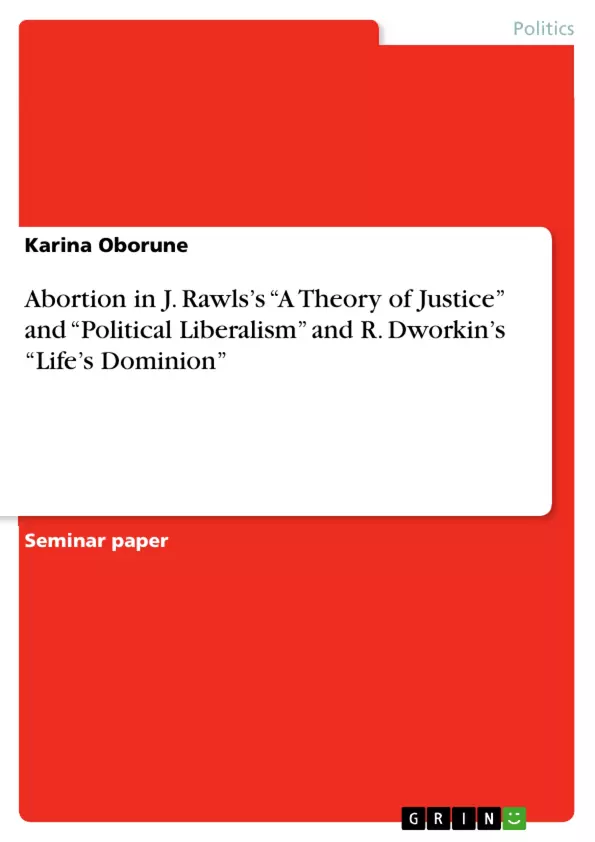The author has compared the issue of abortion focusing on pro-life vs. pro-choice position in Rawls’s theory of justice and political liberalism and Dworkin’s discussion about moral problems of abortion. In the first and second parts of this paper, the author has analyzed the abortion issue from the standpoint of the original position, veil of ignorance, rights and interests, detached vs. derivative position, natural vs. human investment while criticisising the application of Rawls’s natural duties and Dworkin’s intrinsic (sacred) value to abortion. In the final part, Rawls’s and Dworkin’s positions on abortion issues are compared, drawing conclusions on similarities and divergence.
Inhaltsverzeichnis (Table of Contents)
- Introduction
- PART I
- Rawls's "A Theory of Justice"
- Application 1
- Application 2
Zielsetzung und Themenschwerpunkte (Objectives and Key Themes)
The paper analyzes the ethical considerations of abortion through the lenses of John Rawls's "A Theory of Justice" and "Political Liberalism" and Ronald Dworkin's "Life's Dominion." The author compares the pro-life and pro-choice positions within these frameworks, focusing on how these positions are influenced by the social and political context of their drafting.
- The application of Rawls's original position, veil of ignorance, and maximin principle to abortion.
- The role of natural duties, including mutual respect, mutual aid, and the duty not to harm, in relation to abortion.
- The tension between the rights of the mother and the rights of the fetus in the context of abortion.
- The influence of societal views and political trends on ethical positions regarding abortion.
- Comparison of Rawls's and Dworkin's stances on abortion, highlighting both similarities and divergences.
Zusammenfassung der Kapitel (Chapter Summaries)
The introduction sets the stage by discussing the historical and philosophical context surrounding abortion, contrasting the pro-life and pro-choice positions.
Part I delves into Rawls's "A Theory of Justice," examining his views on abortion through two applications. Application 1 explores abortion from the standpoint of the original position, veil of ignorance, and maximin principle. The author argues that from these perspectives, Rawls's framework would likely prohibit abortion. Application 2 examines the implications of natural duties, such as mutual respect, mutual aid, and the duty not to harm, for the issue of abortion. The author analyzes how these duties, while seemingly supporting a pro-life stance, can lead to conflicting ethical obligations in complex situations like rape, incest, or medical complications.
Schlüsselwörter (Keywords)
The paper focuses on key concepts within contemporary political philosophy such as original position, veil of ignorance, maximin principle, natural duties, right to self-defense, pro-life and pro-choice positions, and the ethical and political dimensions of abortion.
Frequently Asked Questions
How does Rawls's 'Veil of Ignorance' apply to the abortion debate?
The author explores whether individuals in the original position, behind a veil of ignorance, would support or prohibit abortion based on principles of justice.
What is the difference between 'detached' and 'derivative' positions in Dworkin’s work?
A derivative position focuses on the rights and interests of the fetus, while a detached position focuses on the intrinsic or sacred value of human life itself.
What are the 'natural duties' in Rawls's theory relevant to abortion?
Key duties include mutual respect, mutual aid, and the duty not to harm, which can lead to conflicting ethical obligations in cases like medical complications.
How do Rawls and Dworkin differ on the issue of abortion?
The paper compares their positions, highlighting how Rawls focuses on political liberalism and justice, while Dworkin emphasizes moral problems and the sacred value of life.
Does Rawls's framework support a pro-life or pro-choice stance?
The author argues that from certain applications of the original position and maximin principle, Rawls's framework might lean toward a prohibition of abortion.
- Quote paper
- Karina Oborune (Author), 2010, Abortion in J. Rawls’s “A Theory of Justice” and “Political Liberalism” and R. Dworkin’s “Life’s Dominion”, Munich, GRIN Verlag, https://www.grin.com/document/150396



